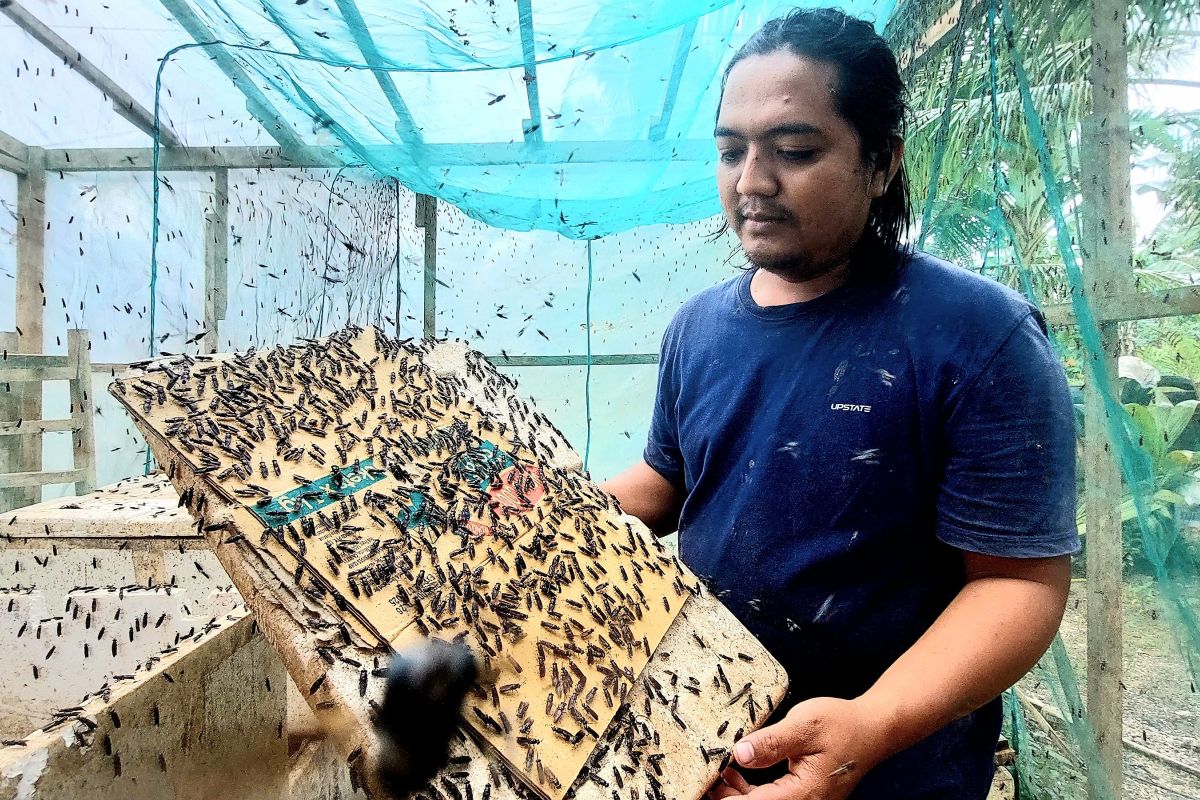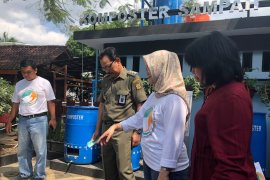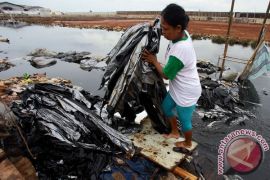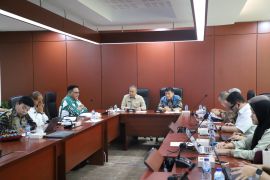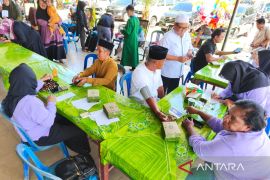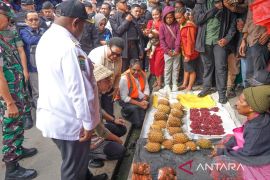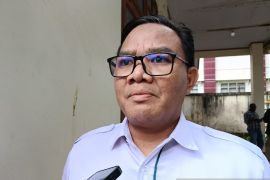Waste has become an indispensable part of Supendi's day-to-day life, as he has been collecting and processing it into something valuable.
Since 2022, Supendi and the Black Soldier Fly (BSF) and Maggot Farming Group have been collecting organic waste from the residents of Aimas District, Sorong Regency, Southwest Papua Province.
His hands move skillfully while sorting the waste and then taking the organic ones before placing them into empty bins that had been readied.
Supendi collects trash from around 200 houses. One by one, they are transported.
In one trip, he can collect around 500 kilograms of organic waste, a quite large volume, to reduce the burden of waste in the final disposal site (TPA).
While carrying out his activities, Supendi took the time to inform the people he met about the importance of sorting waste from the house until its utilization.
He is keen to invite the community to actively participate in utilizing organic waste as an important part of the efforts to overcome the waste problem and maintain a healthy environment.
Every day, from 8 a.m. to 12 a.m. local time, Supendi goes house to house to collect organic waste. He uses the waste for maggot cultivation.
"Organic waste that is already cut into small pieces can be given directly to maggots, but if the leftover food is still hard, then it must be processed first by fragmentation until it becomes soft and then given to maggots to eat," Supendi told ANTARA.
At least 24 biopond boxes are placed inside the production house to accommodate the cultivated maggots. Each biopond containing maggots can decompose up to 20 kg of organic waste.
The man born in 1992 admitted that many people sensed disgust in handling waste, as it leads to something rotten and visually unpleasant.
However, Supendi believes that organic waste has various benefits. In addition to reducing household waste, it also has economic value for meeting the needs for animal feed and natural agricultural fertilizers.
Maggot cultivation
Maggots or larvae of the black flies BSF—which are often misunderstood as dirty and disgusting creatures—are used by the BSF Fly and Maggot Farming Group in Malawili Village, Sorong Regency, to decompose household organic waste.
Supendi started maggot cultivation after coming to the realization that household waste was not well-managed. The waste was even dumped at locations not designated as waste disposal sites.
In addition, household waste can be sorted and processed into natural fertilizer in Sorong—where most of the areas are used for agricultural purposes.
Motivated by the determination to reduce household waste in residential areas, Supendi and his group began to learn autodidactically from various sources about the methods and systems of maggot cultivation.
After gaining extensive knowledge, he learned about the various benefits of BSF flies.
In addition to having a positive impact on reducing organic waste, BSF flies can also serve as additional nutrition for poultry and catfish as well as natural fertilizer for plants.
“Hence, we feel that maggot cultivation must be developed," he remarked.
Maggot cultivation is an easy practice, as it does not require special techniques, so everyone can actually carry it out. The costs incurred are also quite low, only requiring consistency in the intensive care of BSF flies.
Through knowledge and determination, Supendi, along with his group members, began building a maggot cultivation site by utilizing existing natural resources.
The BSF maggot production house that he made looks simple. The building is made of materials from wood and used boards and worn zinc.
At first glance, the production house looks like a hut, although this is where tens to hundreds of thousands of maggots breed.
Supendi and his group are convinced that the goal of developing something useful and beneficial will not be eroded.
In fact, this determination continues to encourage him to innovate in order to respond to the challenges of handling organic waste in Sorong.
In addition to the hut, Supendi and his group made a medium-sized cage equipped with basic facilities as a site for BSF to produce eggs as maggot seeds.
"We harvest BSF fly eggs every two days with a volume of 20-30 grams per harvest," he revealed.
Every BSF egg harvest is always followed by weighing to measure the waste requirements needed after the fly eggs hatch.
If the egg harvest per day is 20 grams, then it means that when the fly eggs hatch at 10-12 days, they will need a lot of organic waste. Each gram of fly eggs hatched can require 2 kg of organic waste every day.
Around half a kilogram of BSF eggs were successfully harvested during one period. This means the waste requirement for nutritional food for half a kilogram of BSF eggs is approximately one ton of organic waste.
For the group, the limited waste collection facilities are not an obstacle to continuing to develop the BSF maggot business. Through strong commitment, a pickup truck from self-help was readied to collect waste from every resident's house.
The organic waste collected daily reaches 500 kg from residents' houses to meet the needs of BSF maggot cultivation.
So far, the results of maggot cultivation are only to meet the needs of the group, and they have not been sold to outside parties.
Best solution
On a wider scale, BSF maggots than can decompose organic waste are considered to be one of the best solutions in handling and reducing waste in the West Papua region.
Head of the West Papua Province Environment, Forestry and Land Service Julian Kelly Kambu appreciated the concern of Supendi and his members for successfully cultivating BSF maggots to address the problem of waste management.
He believes BSF maggot cultivation has dual potential, including reducing organic waste as well as providing a promising business opportunity, opening up employment opportunities, and meeting the need for natural fertilizers for agriculture and livestock.
Carrying out maggot farming is considered to be in line with the government’s focus on a precise solution for handling waste as well as an opportunity for developing the community's economy.
Waste management and reduction are included in the regional strategy policy as stipulated in Governor's Regulation Number 30 of 2023 concerning Regional Policies and Strategies in Household Waste Management.
The gubernatorial regulation aims to also help in achieving Indonesia's target of becoming waste-free by 2025, through a 30-percent waste reduction and 70-percent waste management by 2025.
Hence, BSF maggot cultivation is one of the effective solutions to achieve this national target. This organic waste management model has advantages because in addition to being environmentally friendly, it also provides added economic value to waste.
In relation to this, the West Papua government invites all regional heads in six districts and cities to take concrete steps to reduce and handle waste with the help of a maggot cultivation system.
Supendi and his group have proven that their approach to handling organic waste can reduce their piles while providing added economic value.
Now is the time for every residential area in Sorong District—even in West Papua—to implement an organic waste management model akin to what Supendi and his group have been doing for the past two years.
Related news: W Jakarta using black fly maggots to process organic waste
Editor: Rahmad Nasution
Copyright © ANTARA 2024
